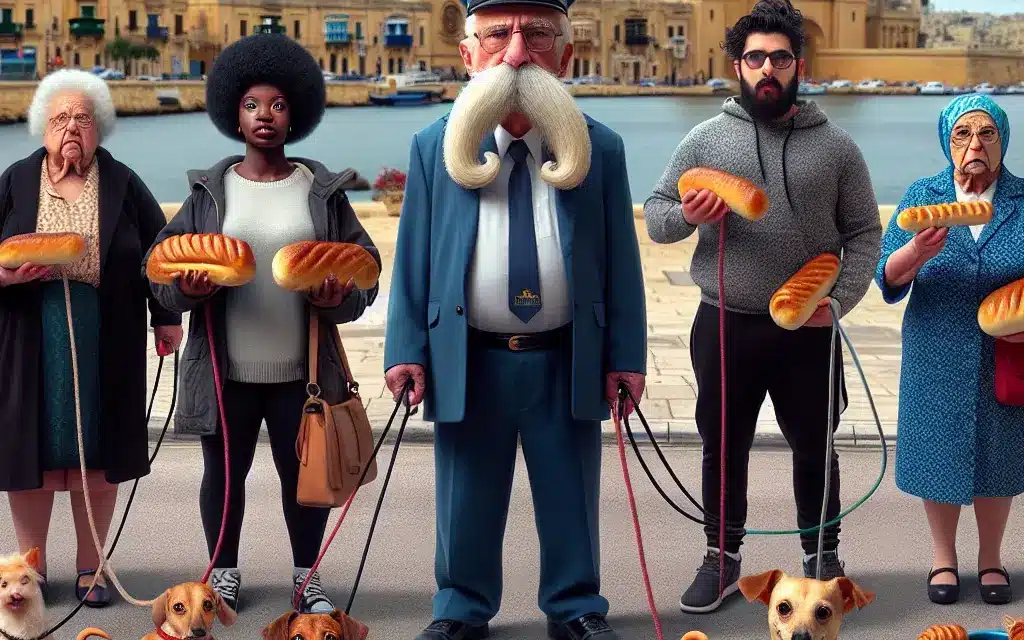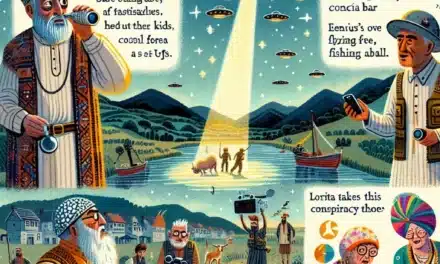The Great Pastizz Adoption Scandal of Sliema
When Pastizzi Became Pets
Uwejja! It was a sunny morning in Sliema when Tumas, a retired postman with a handlebar mustache thicker than a qassata, decided to revolutionize Maltese pet culture. Sick of seeing the same old cats and dogs paraded along the promenade, he announced to the local council his master plan: “Why not adopt pastizzi as pets? After all, they’re far less trouble and already a national treasure!”
With a plan as eccentric as the Mnarja festival without the singing, Tumas set up a pastizz adoption stall decked with tiny leashes and custom-made pastizz-sized beds, each fluffier than a fresh ħobża tal-Malti. The people of Sliema, always up for a bit of novelty, lined up, eager to take a crispy, pea-filled companion home. ‘Times of Mela’ decided to dig in—figuratively, of course.
The First Pastizz Pageant: ‘Il-Belt Valletta’
Malta had seen beauty contests, from the election of l-Aqwa Żagħżugħa in Tarxien to the infamous goat pageant in Gozo. Tumas’ pastizz pageant was set to outshine them all. The contestants were displayed on ornate silver trays at St. George’s Square in Valletta, where judges critiqued the pastries’ golden hue and flakiness. A ricotta-filled morsel named ‘Dolores’ took the crown, sparking envy in the pea pastizz camp.
“This is discriminejsjon against peas,” protested Peppina, a fervent pea pastizz advocate. “Rikotta gets all the attention, but peas have feelings too, mela!”
Ta’ Qali’s Grand Pastizz Parade Disaster
As the trend escalated, a grand pastizz parade was organized in Ta’ Qali. Floats adorned with larger-than-life pastizzi, and dancers dressed as forks and knives twirled through the park. However, disaster struck when a float shaped like a giant ħobż biż-żejt lost control and veered into the picnic area, causing mass hysteria among patrons who believed they were under attack by a rogue sandwich.
The incident left many traumatized, and they’ve since sworn to only eat Ħobża tal-Malti in a closed environment. ‘Times of Mela’ provided exclusive coverage:
“It was like something out of a low-budget horror film,” recounted Il-Majstru, a local ġbejna maker who saw the ordeal. “I can never look at a slice of tomato the same way again.”
Mdina’s Mystical Pastizz Whisperer
Amidst the pastizz pet craze, a self-proclaimed “Pastizz Whisperer” emerged in the ancient city of Mdina. Dun Anġlu, a retired pastry chef with an uncanny ability to calm any agitated pastizz, claimed his gift came from a divine encounter with St. Joseph in a dream. Locals flocked to him for advice on restive ricottas and petulant peas.
The whispers spread like wildfire: “He can communicate with the very dough of our souls,” a wide-eyed devotee shared with ‘Times of Mela’ reporters. People started questioning the existential status of pastizzi. Were they pets, snacks, or spiritual guides?
The Great Reveal: Identity Crisis Averted
Just when the island was spinning in a pastizz-fueled frenzy, an unexpected turn of events brought everything back to reality. The European Union (EU), upon catching wind of the situation, sent a delegation to investigate, fearing the Maltese might have unlocked a new sentient life form.
Investigations ensued, with EU scientists scrutinizing pastizzi under microscopes and engaging in deep dough dialogues. The verdict, announced in an emergency press conference, debunked the myth:
“The EU hereby declares that pastizzi, while a unique and commendable specimen of Maltese culture, are not sentient beings and shall not be treated as pets. We do, however, acknowledge their ability to bring people together and their undeniable deliciousness,” proclaimed Dr. Bernardette Le Puff, head of the EU Culinary Analysis Team.
Relieved and with tongues firmly in cheeks, Maltese citizens returned their adopted pastizzi to the dinner table, saving their leashes and beds for more traditional pets. Tumas, while disappointed by the loss of his ephemeral fame, remained a local legend, and the Maltese kept their spirits high with comforting mouthfuls of their beloved, crispy, non-companionable pastizzi. ‘Times of Mela’ captured the nation’s collective sigh in a final remark:
“In the end, it wasn’t about whether pastizzi could be pets or not. It was about getting together and having a good laugh—over delicious food, that is. Mela, kollox sew as long as you have a pastizz in your hand and a smile on your face!”
And so, the Great Pastizz Adoption Scandal of Sliema was relegated to the annals of Maltese parody history, a tale as layered and flaky as the pastries that inspired it.







Recent Comments